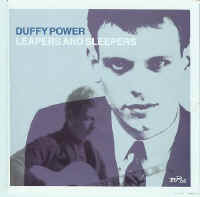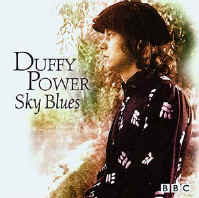|
Duffy
Power never quite achieved the success he deserved, either as a straight
pop star or in his later guise as a respected exponent of the British
Blues and R&B scene in the late 60's. Power started off his career as
an early British Rock 'n' Roller in the closing years of the 1950's
under the management of Larry Parnes. In 1959 he was signed to Fontana
for whom he recorded three singles that year which also appeared on the
brittle but fast-disappearing 78rpm format. First off was a cover of
Bobby Darin's "Dream Lover" which was followed by
"Kissin' Time" and "Starry Eyed" which
lost out to Michael Holliday for chart honours. The following year saw a
solitary release, a cover of Jerry Lee Lewis' "Whole Lotta
Shakin' Goin' On" and two more releases the following year
completed the Fontana contract.
It
would be nearly two years before Duffy saw another release by which time
his musical tastes had started to evolve. The early 1960's saw a period
of relative calm in the Pop world come to a close when a new type of
music exploded it's way into the charts in late '62 and early '63 in the
shape of Merseybeat. Liverpool groups, whose repertoires often consisted
of gutsy R&B numbers previously little-known to UK listeners were
not alone in wanting music with heart and soul and "Beat
Groups" sprang up in many cities across the country as a result. In
this climate of change in early 1963 Duffy, by now having left Larry
Parnes, secured a new deal with Parlophone for whom his initial release
was a version of "It Ain't Necessarily So" which wasn't
a hit.
|
 |
|
Duffy
Power (centre) with the Fentones in 1964 (courtesey of Bill
Bonney. Click for larger view) |
His
next recording was perhaps of his most notable as it was supplied by
fellow EMI artists Lennon and McCartney in the shape of their rocker,
"I Saw Her Standing There", one of their earliest cover
versions. In early
March 1963 the Graham Bond group recruited guitarist John McLaughlin and
renamed the Graham bond Quartet, they signed a five-year contract with
EMI. Their first assignment was backing Duffy Power, on his second stab
at capturing "I Saw Her Standing There" as
the earlier recording was apparently not quite right.
This was a pulsating version which featured Graham Bond's Hammond organ
in an early outing for the instrument on UK recordings.
Power also tracked a
recording of a Bond original, "Farewell Baby".
Next up was taking to the road in April on a package tour that featured
Marty Wilde and Joe Brown on the same bill.
Perhaps
unsurprisingly the Lennon/McCartney opus was released as the topside of
Duffy's new single in May. It was apparently meant to be the b-side, but
the powers that be at Parlophone flipped the single prior to release.
During the early Summer of '63 "Duffy Power and the Graham Bond
Quartet" promoted the single on two BBC radio sessions,
"Saturday Club" in June and in "Pop Goes The
Beatles" the following month but it didn't register on the charts.
Between them they also found time to record a brace of Ray Charles songs
at EMI, but this time the results went quietly unreleased.
|
 |
|
Duffy
Power's recent CD compilation, featuring a few tracks cut with
the Fentones (Click for larger view) |
1964
saw a development Duffy's new musical path with the release of "Parchman
Farm" (also done by John Mayall and his Bluesbreakers) coupled
with "Tired, Busted And Broke". On this waxing Southend
group and fellow Parlophone signing the Paramounts ("Poison
Ivy", "I'm The One Who Loves You") lent their weight to
the backing but the record went the same way of the others by missing
out on a chart position. During 1964 the Fentones (yet another
Parlophone act) had been looking for a singer to front them as their
original vocalist Shane Fenton (later known as Alvin Stardust) had moved
into management. Power needed a backing group for recordings plus live
dates and so the two parties struck up a working relationship.
Fruits
of Duffy Power and the Fentones liason in the recording studio were
versions of "Money Honey" and "Lawdy Miss
Clawdy". The Fentones' drummer Don Burrel vacated his drum
stool around this time and for this session his place was taken by
Ginger Baker. Baker, previously a member of the Graham Bond Quartet, had
appeared on Power's debut waxing for Parlophone of "I Saw Her
Standing here" in 1963. The tracks were destined to make up
Power's next single but never materialised, languishing in the vaults.
They finally appeared in 2002 on a new Power compilation CD "Leapers
And Sleepers" from RPM Records.
From
around this time on Duffy supplemented his solo career by joining Alexis
Korner's Blues Incorporated and featured on the group's album "Red
Hot From Alex" from the same year. He also appeared on two
further albums, "Sky High" (1966) and "Blues
Incorporated" (1967). Jack Bruce, who had previously been
with Graham Bonds' group plus bassman Danny Thompson and drummer Terry
Cox appeared behind duffy on some recordings made during that period.
(The results from these informal sessions were later compiled into what
would be Duffy's debut album "Innovations" in
1971.) Also featured was another ex-Graham Bond man, guitarist John
McLaughlin who followed Duffy into his next venture, the short-lived
Duffy's Nucleus who released just the one single, "Hound Dog"
/ "Mary Open The Door" for Decca. After the demise of
the 'Nucleus's in late 1967 Duffy resumed his solo career but despite
recording further singles over the next few years and the release of his
debut album "Innovatioans" in 1971 no chart
recognition was forthcoming.
 Two
Duffy Power CD's are currently available, one of which (the previously
mentioned "Leapers
And Sleepers")
collects the best of his recorded works, including some unreleased
items. The other, "Sky
Blues"
(left) is a collection of his recordings for various BBC radio shows
between 1968 and 1973, some of which were thought to have been wiped,
others being rescued from cleaned-up home recordings. They
cover the range from "That's All Right Mama" to "Gin
House Blues" and includes a version of his 1963 single "I
Saw Her Standing
There", probably his best known track. None of the 19
recordings have been heard since their first broadcast and include a
bonus session from 1994. Two
Duffy Power CD's are currently available, one of which (the previously
mentioned "Leapers
And Sleepers")
collects the best of his recorded works, including some unreleased
items. The other, "Sky
Blues"
(left) is a collection of his recordings for various BBC radio shows
between 1968 and 1973, some of which were thought to have been wiped,
others being rescued from cleaned-up home recordings. They
cover the range from "That's All Right Mama" to "Gin
House Blues" and includes a version of his 1963 single "I
Saw Her Standing
There", probably his best known track. None of the 19
recordings have been heard since their first broadcast and include a
bonus session from 1994.
Although
Power retreated quietly from the music three years later he is still
highly regarded today as a pioneering folk blues performer, not to
mention his singing, songwriting and harmonica playing. His long
recording sheet belied the fact that he experienced no chart movement
and his more adventurous sides are sought out today by those in the
know. In particular his mid-60's performances often shunned the pitfalls
of oft-used cliches typical of the genre. As a result, his recordings
were often sincere and fresh, while at the same time reflecting the evolving nature of the
British Rock scene in the process.
|



